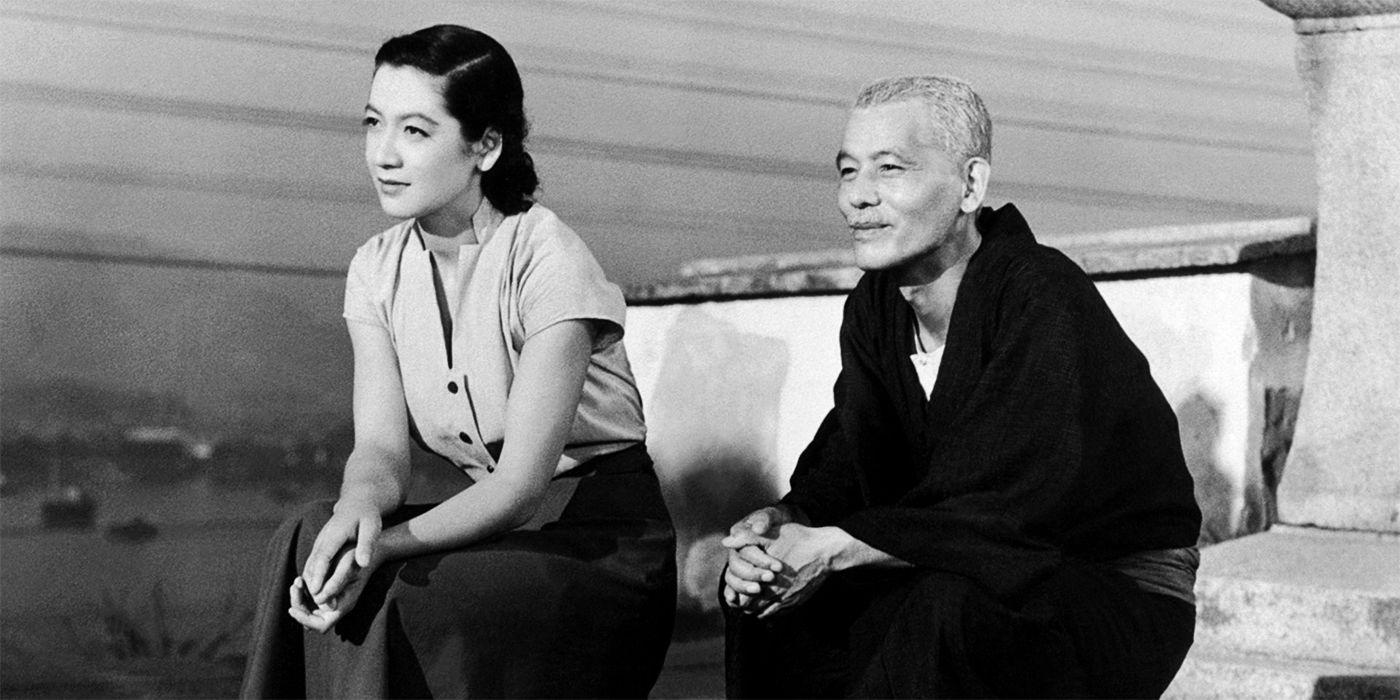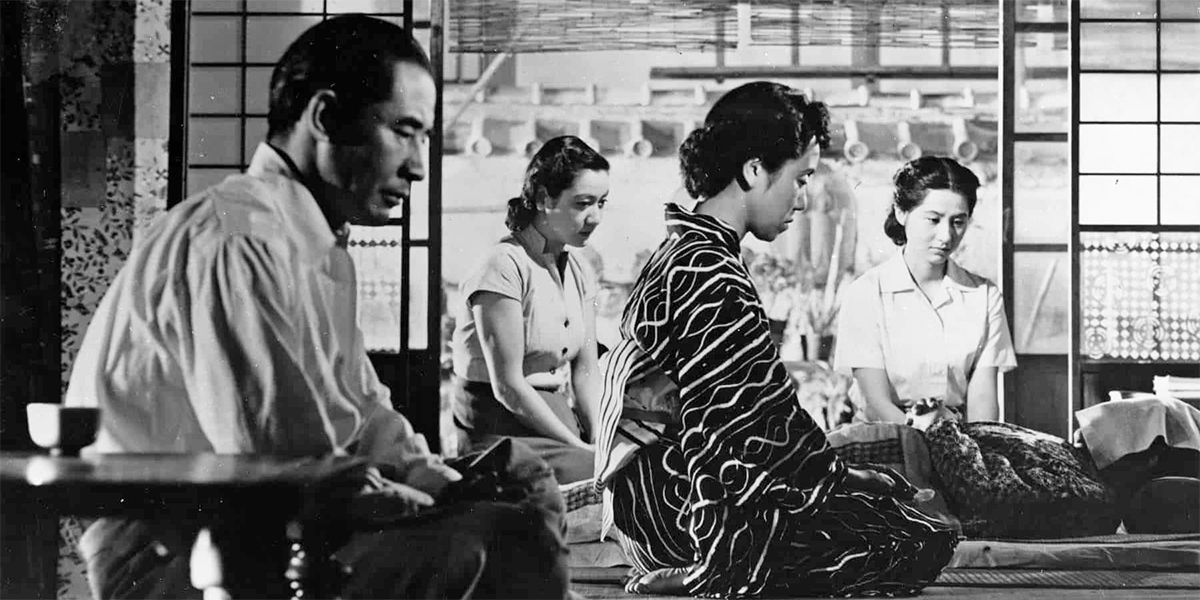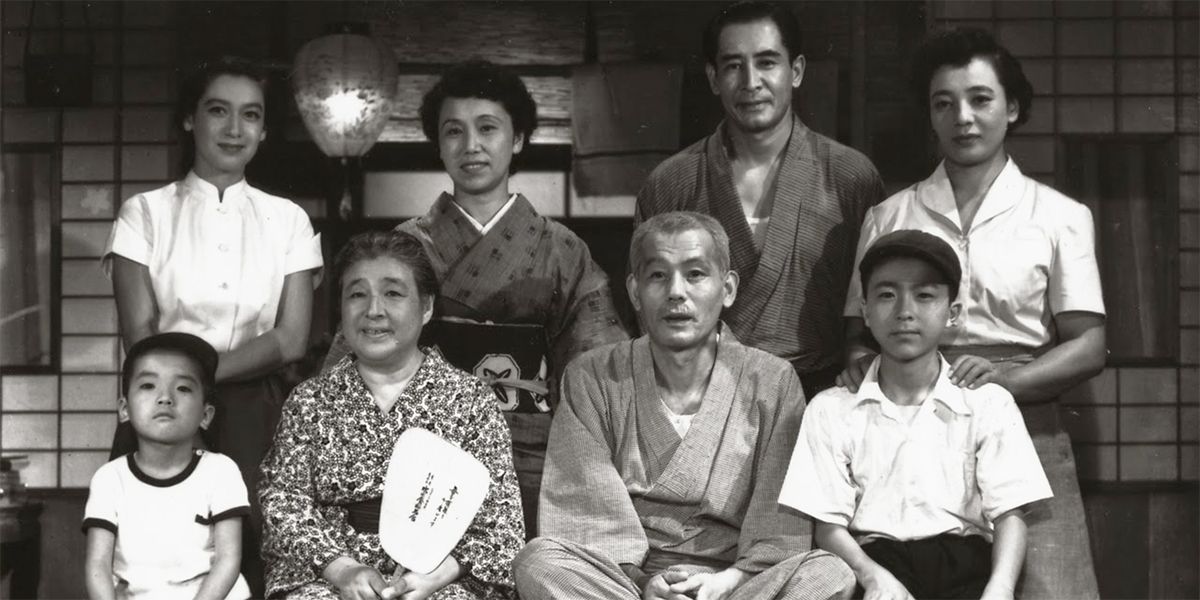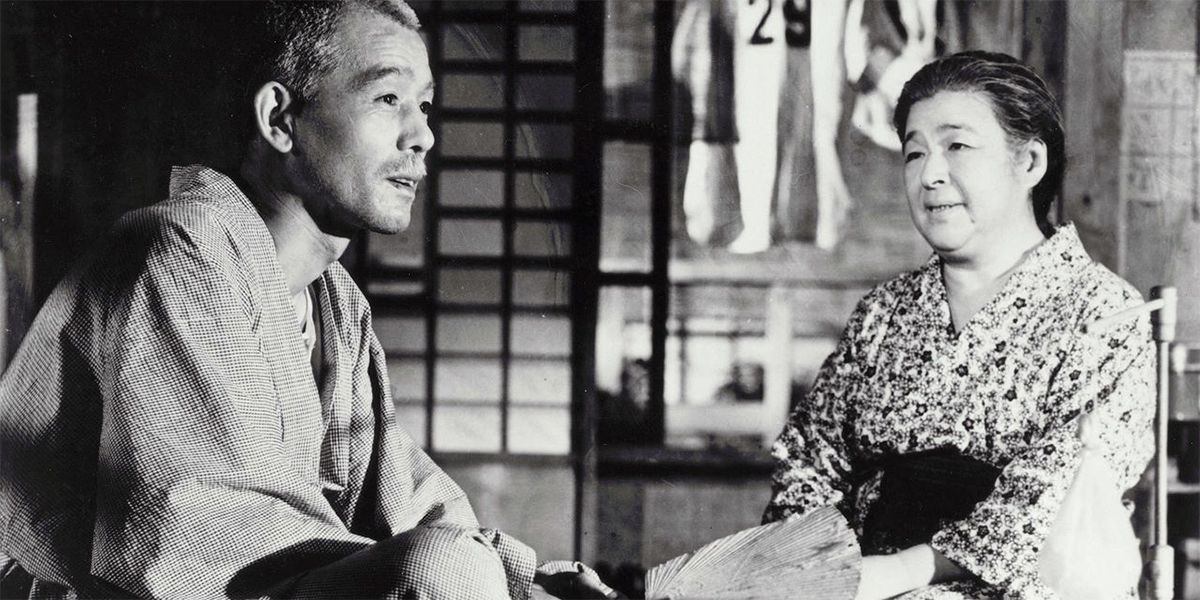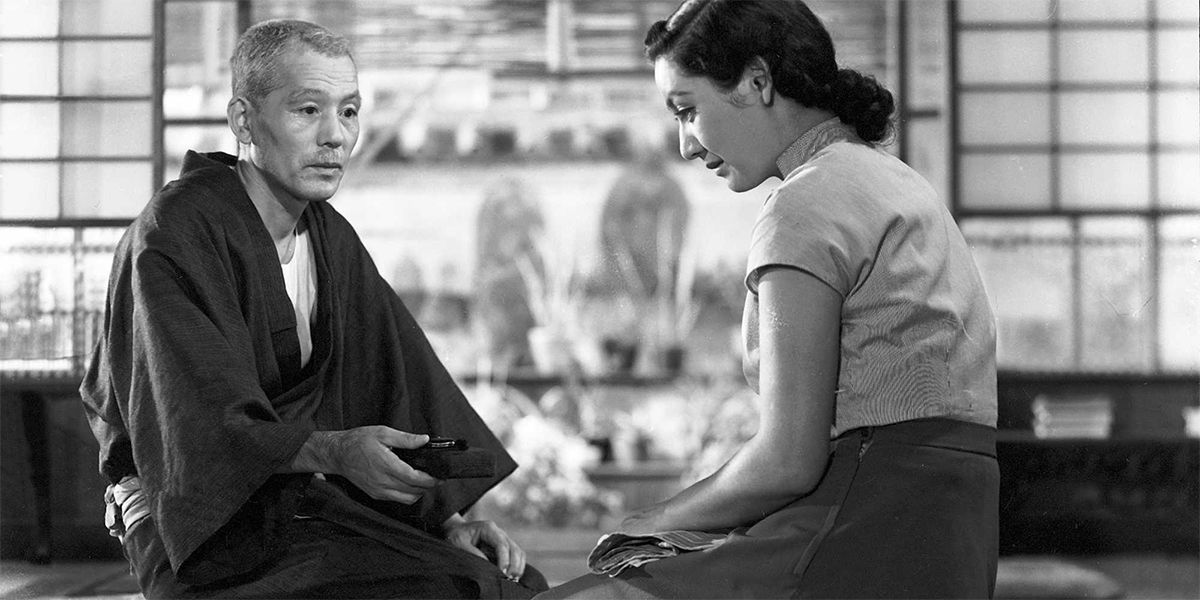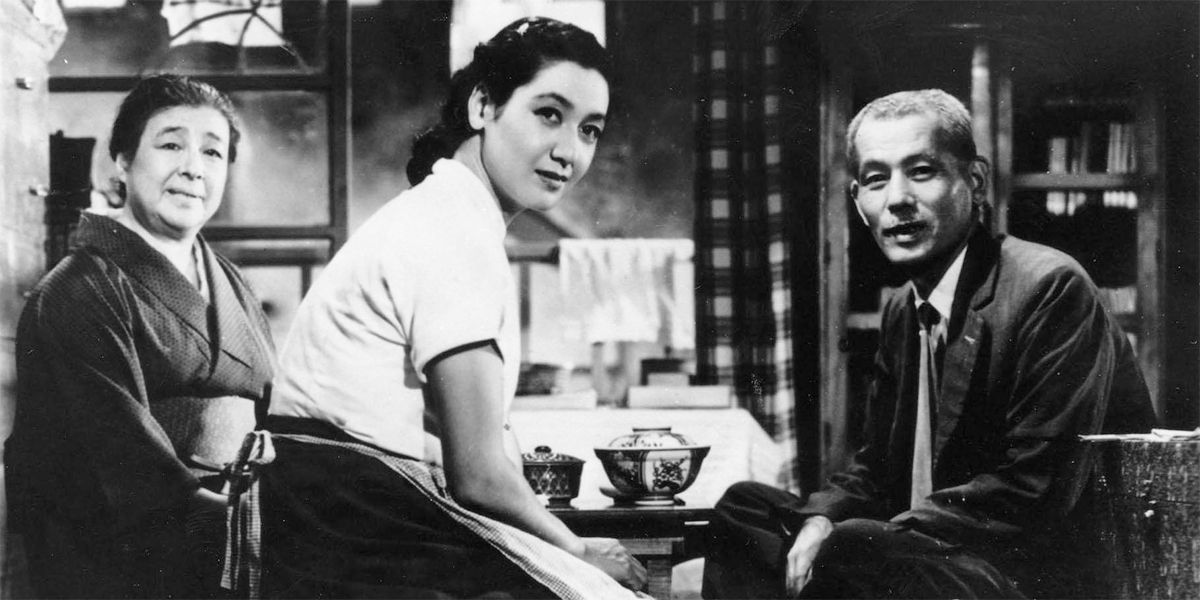It can be argued that Yasujirō Ozu, one of cinema’s greatest and most poetic artists, has made the same film over and over again for nearly his entire career. His minimalist and formally clean style undergo little variation for the decades that he directed movies, and a vast majority of his greatest works grapple with a relatively small batch of central themes, such as familial relations, marriage, intergenerational conflict, and the sweeping Westernization of Japanese culture.
Ozu devotees, however, will quickly tell you that the man didn’t stray from his trademark because he didn’t need to. It was already perfect. Ozu has a loyal following of enthusiastic fans and students – a personal favorite of revered film critic Roger Ebert, film theorist and filmmaker Paul Schrader, and essayist/filmmaker Kogonada, among many others. Kogonada’s recent drama After Yang, shares plenty of stylistic DNA with Ozu, with obsessively clean framing, familial themes, and a blatant disregard of the 180-degree rule (albeit in an entirely novel way). There is also a thread connecting Ozu with Wes Anderson, as seen in Kogonada’s pre-directorial video essay comparing the influence of the former on the latter.
With no shortage of loyalists decreeing Ozu as the greatest filmmaker to ever live, it quickly becomes easy to see that the Japanese master of cinema somehow managed to never make the same film twice...even when he essentially did. Ozu’s filmography features several sets of remakes in which the director retells a story later in his career, as with A Story of Floating Weeds and Floating Weeds or Late Spring and Late Autumn.
Tokyo Story, Ozu’s 1953 magnum opus, has frequently been acclaimed by filmmakers and critics alike as the greatest film ever made, and it very arguably could be. Regardless of where you’d place it on the hierarchy of the “best ever’s", Tokyo Story is certainly the ultimate family film—that is, the ultimate film about family and what family actually means. It is, of course, about a family, observing three generations in a single unit to analyze the vast differences that separate them. In movies like Late Spring and Early Summer, Ozu looks at the changing face of Japanese culture in the ’50s, when a younger generation challenged and defied traditions that were pivotal to older generations, and in Tokyo Story he places a lot of value on family, but one that doesn’t necessarily place judgment upon those who abide by the inevitability of change. Each generation has its own set of cultural rules that they follow, without a single generation being “right” or “wrong”. It’s much more complicated than that, and Ozu tells the audience that family is just that: complicated.
Even considered among Ozu’s other works, Tokyo Story is a particularly poignant study of all things familial partially because it gives such evenly-spread attention to a large family unit. While the film certainly makes its share of sweeping statements about the fast-paced modernization disassembling the traditional family unit, it also lends a sense of empathy to each member of the family, even those who seem unfairly aloof.
Shūkichi (Chishu Ryū) and Tomi (Chieko Higashiyama), the parental figures in the film and the eldest of three generations, attempt to visit their children who are living fast-paced lives in Tokyo. The children don’t seem to have any time for them – there’s too much going on. Kōichi (So Yamamura) and Shige (Haruko Sugimura) work too much. They’re just trying to keep up with the increasingly fast pace of their contemporary society. Their parents are more of an inconvenience than anything else, and even if it isn’t exactly personal, the children seem to wish that they weren’t around. When Shūkichi and Tomi arrive at Kōichi’s to meet their grandchildren (Zen Murase and Mitsuhiro Mori), the two boys take refuge in their room. There isn’t really any interest in meeting their grandparents. These two elderly folks are just strangers to them, and the boys don’t really care to get to know them.
It’s a scene played partially for laughs (Ozu’s filmography often features rascally, disobedient young boys whose attitudes are endearingly stubborn), but its implications are undeniably tragic. Here are two folks coasting into the golden years of their lives without any closeness with their grandchildren. Later, the couple reflects on the behavior of their grandchildren, agreeing that they prefer their adult children. Again, it’s a moment of genuine comedy that conceals a melancholic core. The boys are naughty, even downright rude, but can it really be considered their fault? They have never met their grandparents before, and they’ve never been taught how to act toward them.
Ozu doesn’t dismiss these kids as being scornful. In films like the comedy Good Morning and the silent picture I Was Born, But..., children exist at the center. Their rebellious ways are rooted in a justifiable inability to understand the arbitrary social mores of the adult world. In Tokyo Story, they’re a bit spoiled—bratty even—but they can’t be blamed too harshly for not immediately attaching to these two elderly folks that they’ve never met before in their lives. Why has it taken so long for them to meet their grandparents? Life just got in the way. Tokyo Story is a particularly great movie about family because it’s reluctant to point its finger too sharply in the direction of any one particular character. Kōichi and Shige really do try to make time for their parents. Clearly, they aren’t trying hard enough, but their situation is still understandable. They do have business to tend to.
Ironically, the couple’s widowed daughter-in-law Noriko (Setsuko Hara) is one of the only members of the family that seems to make any time for them. She is the most sympathetic to them, and she’s also the most understanding when it comes to the fact that distance between generations is largely unavoidable. Noriko is arguably as busy as the rest of the Hirayamas, but she’s able—or, more accurately, more willing—to make time for Shūkichi and Tomi. The love she keeps for her in-laws is obviously genuine, and it appears as though she gets as much out of the couple’s visit as they do.
Noriko isn’t of blood relation, and through the presumed death of her husband Shōji, she doesn’t really keep any ties with the family any longer. She is young and professional, and there is little reason why she couldn’t remarry should she want to. Only, despite her loneliness, she doesn’t want to remarry – partially out of loyalty to Shōji, partially out of loyalty to her parents-in-law. With Noriko, Tokyo Story adds a layer of complexity to its portrayal of family. What makes a family, beyond blood and genetics? Noriko is only legally a member of the Hirayamas through her deceased husband. Minoru and Isamu, the two grandchildren, are direct descendants of the Hirayama bloodline, yet they’re complete strangers to the eldest generation.
Though the parents become lonely and disappointed, Ozu practices his typical fashion of avoiding melodrama and excess sentimentality. It’s a sad story, one that will make you want to phone your parents, but it also embraces the tides of time as being pivotal to life itself. When the children move out and begin lives of their own, it becomes increasingly difficult to make time for their parents. Life just changes, as it does. It’s a reality that becomes only more true and relevant in contemporary times. Tokyo Story was made nearly seventy years ago, but it has a truly timely message at its core: try, as much as you can, to make time for your loved ones.
Ozu relishes in the realities of the imperfections of a family unit. When Shūkichi goes to visit his friend Hattori, the men get drunk and complain about their families. Shūkichi vents to his friends that he is disappointed at his son being “only a small neighborhood doctor”. “Times have changed,” he goes on to say, “we have to face it.” His drunken confession that his son’s vocation isn’t enough to satisfy him makes his son’s inability to make time for him tragically ironic. Kōichi is too busy with his career as a doctor to spend proper time with his parents, and for what? His father is dissatisfied regardless.
Tokyo Story succeeds so well in its portrayal of a complicated family unit because of these imperfections in each character. If the children are to blame for being distant and aloof, the father is to blame for being too harsh on his son. When he arrives back at his daughter’s in a blissful state of intoxication, Shige is contemptuous of her father’s drunken state. She reflects on his alcoholism, which was a prevalently unpleasant part of her childhood. “We hated it,” she admits about his drinking.
Thus, the distance between the generations becomes even more complex. Shūkichi’s drunkenness during his children’s youth undeniably created an emotional barrier between them. Decades later, his children genuinely don’t have time for him, and are they to blame? Is he? Shige admits that he gave up drinking after the birth of his youngest child, which is a sign that he turned over a new leaf with his family. In Tokyo Story, Ozu isn’t satisfied with equating any one person with immorality or insensitivity. Everybody and nobody is to blame.
The technical side of Tokyo Story furthers its status as one of the greatest films about family. It’s a rare thing to see a camera movement in an Ozu film; Tokyo Story has one. Keep an eye out for it next viewing. Instead, Ozu placed the camera low on the floor, at the same level that families typically sat on their tatami mats. By keeping the camera primarily at this level, the conversations become intimate. The viewer almost becomes a silent member of the family, one who’s as present in the affairs as anybody else. In Ozu’s films, the camera often broke the 180-degree rule by having characters talk directly to the camera. Thus, the viewer is placed directly in the center of the conversation. They are there, amongst the family.
Ozu rarely ever strayed from portraying the subtleties and regularities of everyday life. Most of his films, while dramatic, are stripped of narrative meat down to their bare bones. Moments of melodrama and intrigue are typically forgone in favor of quiet and poetic meaning hidden behind subtle movements, expressions, and dialogue that hide the characters’ true feelings and expressions. Tokyo Story excels at this, perhaps more than any other selection from Ozu’s filmography. As in Late Spring, Tokyo Story has a melancholic ending, one that leaves a family tragically fractured. But even as Tomi unexpectedly passes away, leaving the children to wonder whether they should have made more time for their mother, Ozu subverts the melodrama. He presents it clearly as it is, without manipulation. The viewer is free to feel their own emotions.
As Kyōko, the couple’s youngest, scolds her siblings for not making time for their parents, Noriko calms her sister-in-law, explaining that she has yet to understand how life’s obligations often get in the way of familial duties. Noriko loves her in-laws, and she’s unquestionably the most sympathetic and understanding of any other character in the film. The fact that she’s only a part of the family via marriage doesn’t matter. She’s an integral part of the unit, and she’s right. Life often unexpectedly gets in the way. The only thing we can do is try our best.

